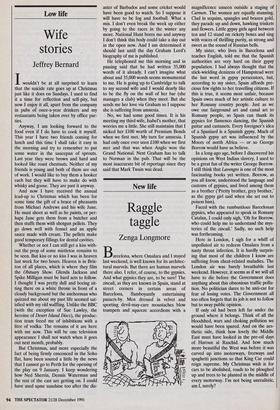New life
Raggle taggle
Zenga Longmore
Barcelona, where Omalara and I stayed last weekend, is well known for its architec- tural marvels. But there are human marvels there also. I refer, of course, to the gypsies. And what gypsies they are, to be sure! The zincali, as they are known in Spain, stand at street corners in certain areas of
Barcelona, flamboyantly entertaining passers-by. Men dressed in velvet and sporting devil-may-care moustaches blow trumpets and squeeze accordions with a magnificence unseen outside a staging of Carmen. The women are equally stunning. Clad in sequins, spangles and brazen gold, they parade up and down, hawking trinkets and flowers. Little gypsy girls aged between ten and 12 stand on rickety boxes and sing with voices of thrilling purity, as strong and sweet as the sound of Russian bells.
My sister, who lives in Barcelona and teaches English, told me that the Spanish authorities are very hard on their gypsy population. I had always thought that the stick-wielding denizens of Hampstead were the last word in gypsy persecutors, but, according to my sister, Spain affords pre- cious few rights to her travelling citizens. If this is true, it seems most unfair, because Spain owes much of her artistic culture to her Romany country people. Just as we owe our fairground art and canal art to Romany people, so Spain can thank its gypsies for flamenco dancing, the Spanish guitar and castanets. Every foreigner's idea of a Spaniard is a Spanish gypsy. Much of Spanish gypsy art was influenced by the Moors of north Africa — or so George Borrow would have us believe.
In a long-ago age, before I discovered his opinions on West Indian slavery, I used to be a great fan of the writer George Borrow. I still think that Lavengro is one of the most fascinating books yet written. Borrow, as you all know, understood the language and customs of gypsies, and lived among them as a brother (Pretty brother, grey brother,' as the gypsy girl said when she set out to poison him).
Faced with the rumbustious Barcelonan gypsies, who appeared to speak in Romany Catalan, I could only sigh, 'Oh for Borrow, who could help me to understand the mys- teries of the zincali.' Sadly, no such help was forthcoming.
Here in London, I sigh for a whiff of unpolluted air to redeem Omalara from a nasty throat infection. It is hardly surpris- ing that most of the children I know are suffering from chest-related maladies. The London air was barely breathable last weekend. However, it seems as if we will all have to die before the Government does anything about this obnoxious traffic pollu- tion. No politician dares to be anti-car for fear of losing votes. The Government all too often forgets that its job is not to follow but to sway public opinion.
If only oil had been left far under the ground where it belongs. Think of all the bloodshed, wars and choking pollution we would have been spared. And on the aes- thetic side, think how lovely the Middle East must have looked in the pre-oil days of Haroun al Raschid. And how much more beautiful the West was before it was carved up into motorways, freeways and spaghetti junctions so that King Car could reign supreme. My Christmas wish is for cars to be abolished, roads to be ploughed up and trees to be planted in the middle of every motorway. I'm not being unrealistic, am I, surely?










































































































 Previous page
Previous page